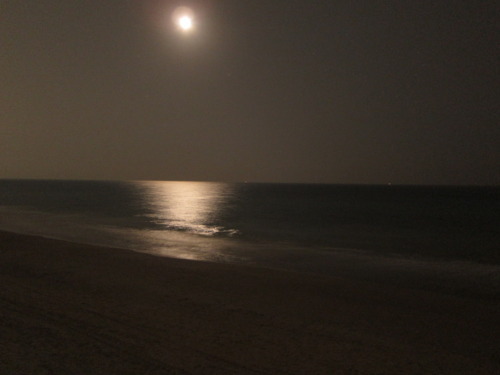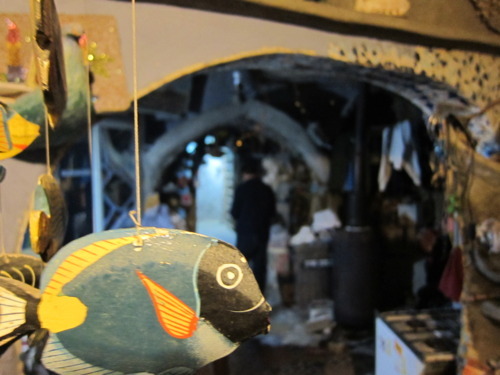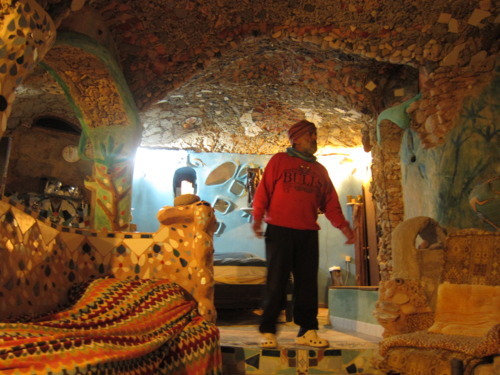If you would like to see a video interview with Nissim, the man named in this blog post, click here.
Thirty minutes after climbing into Hamutal’s brother’s car, we were creeping along a dark dirt road behind Appolonia, an ancient archaelogical site. We rounded a bend in the road and found the mosque, quiet, but illuminated by amber lights.

We stopped to look at this, and then Hamutal got on her mobile to find the cave. We were here to visit Nissim, a man who 39 years ago moved back to Israel from Chicago, leaving a wife behind who did not like his idea to spend the rest of his life in poetic, and maybe sometimes irascible, seclusion in a cliffside overlooking the Mediterranean Sea.
The moon was falling down to the ocean as we went down one set of stairs, and then a whistle and a loud “Hallo!” told us that we were descending the wrong staircase.

Back up we went to a big guard dog and Nissim, who stood in a Chicago Bulls sweatshirt and greeted us in rough Hebrew.
Into his house we went. Two storeys of pebbles, mosaic tiles, and winding tunnels built into the cliff. Three decades of fights with the local government and “idiot engineers,” who did not understand how this one man, with his stocky frame and his incessant smoking, could lift, haul, drag and bring back to the dark cave, all the equipment and materials that would build his home.

We listen to his story. A true cave man, Nissim prefers to live here alone. He has allowed the two sons of a London billionaire family to live here for a couple of weeks last summer, but he won’t let just anyone stay here.
We gather, six Israelis, two Americans, and have wine and smokes. We open the window in the second level of the house to let in the cool night air and the growling of the dog outside prompts the long-haired Hebrew-speaking girlfriend of one of the men to complain. So negotiations are made, and the window is cracked.
Israelis love to talk and when they talk, they talk about things I have not been able to talk about in New York.
Dan P., a venture capital investor from Tel Aviv, tells me that he got the impression reading the Steve Jobs biography that Jobs was not a happy person. We begin to discuss what narcissism does to product development. The theory is that a narcissist is so unhappy and so dissatisfied with his self, and his lack of true self hood, that he seeks high quality and perfection in everything outside of himself.
He tears down people, ridicules and belittles them in a pattern of projection against himself. And then he sets himself on a mission to create the perfect thing, to be inspired and deeply affected by purity.
That’s what makes Apple products so good. An incessant, constant, ambitiously driven life journey to make the things that make life easier, that smash together art and humanity, science and life, into a fission of the previously impossible.
I look around at Nissim’s place. This is a different kind of fission. Decades of rock-dragging. Each bottle of beer glass broken down to form a piece of the mosaic flooring. Clamshell roof overhangs and balcony tabletops bejewelled with sea shells shaped into a whimsical octopus staring back at you during a morning coffee.

It is a folk artist’s house. A wooden carved fish collage hangs from the ceiling in the foyer. It’s as if Nissim has created his own underwater — certainly underground — world. This is a retreat from the chaos of life, and an order has been set literally into stone, to escape a trial by fire that has been life for the 39 years he has carved it out.
We sit and drink and discuss airplane travel, and making airports the social places that we want them to be, dragging our humanity through their terminals from one life origin to another life destination. Why is so much life lost in the middle, in the tubed carbine airplanes that split the air, and in the overly noisy airplane departure lobbies that blare at us their news stories of terrorism, nuclear threats, lost children and the decay of urban America, Europe, or rising chaotic Africa?
We don’t know, other than to assume nobody has tried. The artists have hidden. They seem to have been run underground, like Nissim.
Nissim left us earlier that night, puffing on his hand-rolled cigarette, he may have thought we were too many, and too hard to track. He seems a man of focus, who will nail you to this story, while you indulge his sanguine anger.
We finish the night. We drive back into the city.
I think about Nissim and why he is there, and then it dawns on me that his cave in the cliff wall is only 300 meters from ancient Appollonia, an ancient site that was razed to the ground by successive colonizers. The Appolonia story (it has also been called Asurf), mimics Nissim’s own.
Earlier in the decades, when Nissim had just come back from Chicago, he tried to build what he called a dinosaur. The Israeli government officials razed it. He tried it again, they razed it.
He began to build, and build and dig and dig, again and again, and each month or so, engineers would come back to marvel at how he could build this thing without it collapsing. Nissim keeps calling them idiots, who don’t know a thing about building.
He holds up a clam shell. See? No supports. It’s like this clam shell. Nissim takes from the sea, just as he takes from history an ancient knowledge about building and constructing. I have it that he’s like the return of some ancient emperor, smoking his hand-rolled cigarettes, wearing a head wrap, and trying to convince the gods and the civil engineers that something of the old way of life.

You can always tell the frustrated and the passionate. They have their words always ready at the tip of their tongues. They have seen change, because they come from a past rife with it. They bring that past into the light, they look out over the sea, and observe us. Like the idols we have made to represent them, they stand there, almost etched in stone, stultified by how the civilization around them tries to make them permanent.
They lament, alone at night, their inability to move forward, so much of their creation coming from looking back.
Here is a link to the interview with Nissim.

Douglas Crets is an intelligence officer and expert network builder for the social web. Using his training in journalism, digital media, anthropology and the humanities, he creates social media research projects for and about the leading social web entrepreneurs of today. His company, dB C Media provides companies and individuals with data, behavioral research studies, branding advice, consulting on social media execution and meaningful media content to create efficient interactions with consumers, and influencers and on the web, so that brands, companies and individuals can form relationships that matter. His traveling takes him to at least 12 countries a year. He speaks Russian and understands Chinese.








